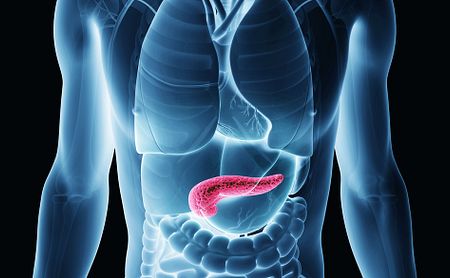MS1819 Plus PERT Aids Digestion in People With Severe EPI, Trial Indicates
Written by |

xsense/Shutterstock
Combining AzurRx BioPharma‘s investigational therapy MS1819 with standard pancreatic enzyme replacement therapy (PERT) can improve fat absorption in cystic fibrosis (CF) patients with severe exocrine pancreatic insufficiency (EPI), interim data from a Phase 2 clinical trial indicate.
“The overarching goal of our MS1819 program is to provide a safe and effective therapy to control EPI, a debilitating gastrointestinal condition common to patients with cystic fibrosis that can result in numerous, life-altering complications, including malnutrition,” James Pennington, MD, chief medical officer of AzurRx, said in a press release.
“Based on the clinical evidence from the combination trial to-date, we have been able to improve the nutritional status of the severe EPI patients who need the most help,” Pennington added.
In EPI, the thick mucus that characterizes CF blocks the release of certain enzymes from the pancreas that are needed for normal digestion, especially of fat. PERT is a standard treatment for EPI, which uses fat-digesting enzymes from pigs. However, many people with severe EPI have inadequate nutrition even with PERT treatment.
MS1819 is a synthetic fat-cleaving enzyme, called a lipase, designed to aid fat digestion in people with EPI. A yeast-derived digestive enzyme, MS1819 does not contain animal products.
The Phase 2 clinical trial (NCT04302662), sponsored by AzurRx, is testing MS1819 in combination with standard-of-care PERT in 20 people, ages 12 and up, with severe EPI. All are given MS1819 at increasing daily doses of 700, 1200, and 2240 mg for 15 days, in addition to PERT.
The study’s main goal is to examine the effect of the combo treatment on the coefficient of fat absorption, or CFA. As its name suggests, CFA is essentially a measure of how much fat is absorbed by the body during digestion.
This interim top-line data on the first 18 trial participants show that, on average, adding MS1819 to PERT increased CFA by 5.9 points. Notably, a five-point improvement in CFA is considered clinically meaningful.
“It turns out that the patients with the lowest baseline CFAs had the largest improvements in CFA in the study,” Pennington said. “It is also very encouraging to note that all the patients responded well and that many reported that they felt better overall when MS1819 was added to their daily dose of PERT.”
Based on these interim results, “we believe that the combination therapy has significant potential to help the 25–30% of refractory cystic fibrosis patients with severe EPI who are unable to achieve adequate nutrition using PERT alone,” said James Sapirstein, president, CEO, and chairman of AzurRx.
“Adding MS1819 to the treatment regimen appears to enable these patients to meet their nutritional needs, reduce the debilitating symptoms of EPI, and improve their overall quality of life, with an acceptable safety profile,” Sapirstein added.
Full trial results are expected in the coming months.
AzurRx recently reported mixed top-line results from a separate Phase 2 clinical trial, called OPTION 2 (NCT04375878), comparing the safety and efficacy of MS1819 against standard PERT. While MS1819 alone had a good safety profile, it was not as effective as PERT at improving fat absorption.






